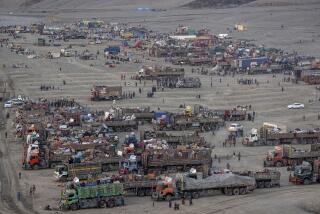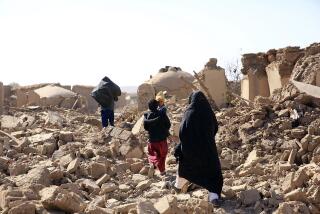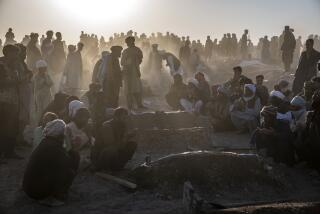Afghanistan attacks kill dozens of civilians
KABUL, Afghanistan — In one of the year’s deadliest days for Afghan civilians, at least 39 people were killed and more than 100 hurt Tuesday in attacks that spanned the country from north to south, including the brutal tactic of a suicide bombing staged at a hospital where victims of an earlier blast were being treated.
The more lethal of the two blasts in Nimruz province involved nearly a dozen would-be bombers, authorities said, although all but three were arrested or killed before or during the attack. Nonetheless, it showed the insurgents’ willingness to sacrifice large numbers of fighters in a single operation and their continuing wherewithal to stage complex and coordinated attacks.
The blasts also reinforced a pervasive sense of insecurity felt by many Afghans. Civilian war casualties fell by 15% in the first half of the year compared with the same period in 2011, the United Nations reported this month, but the advent of the warm-weather “fighting season” has seen an increase in violence across Afghanistan.
Most of those killed in the triple suicide bombing in Nimruz province, in southwestern Afghanistan, and a remote-controlled blast in Kunduz province in the north were people out shopping for their nightly iftar, the meal that breaks the dawn-to-dusk fast during the Muslim holy month of Ramadan, and for the holiday feast beginning this weekend that marks Ramadan’s end.
There was no immediate claim of responsibility for the attacks. The Taliban at times refrains from acknowledging having carried out suicide bombings and other strikes that kill large numbers of civilians.
Insurgents often stage near-simultaneous bombings and have sometimes targeted medical facilities. However, the notion of deliberately hitting a hospital to which injured people were being taken was shocking to most Afghans, even by this war’s grim standard. The bombings were widely condemned, with Gen. John Allen, the U.S. commander of the Western military in Afghanistan, calling them “intentional mass murder.”
The spasm of bloodshed comes at a time when the NATO force is preparing to wind down its combat role and hand over responsibility for securing the country to the Afghan police and army by the end of 2014, raising troubling new questions as to whether the insurgency can be contained when foreign troops depart.
The first of the two attacks took place in the town of Zaranj, the capital of Nimruz. There, explosions tore through a bustling bazaar and two nearby sites, including the entrance to the city’s main hospital. The second early-evening strike took place in Kunduz’s Dasht-e Archi district, where a bomb attached to a motorcycle killed at least 10 civilians and injured more than two dozen in a shopping area, said Enaytullah Khaleeq, a provincial spokesman.
The carnage in Nimruz could have been even worse, given that police arrested several would-be bombers in raids before the attack and killed or detained several more during it, said Abdul Majid Latifi, the provincial deputy police chief. Latifi said most of the 29 victims were civilians but included four police officers.
In Nimruz and Kunduz, the targets were civilian areas, distant from any military installation. The North Atlantic Treaty Organization force is not even deployed in Nimruz, which borders Iran and volatile Helmand province. Last weekend, a policeman in the province turned his weapon on fellow officers, killing 10 of them.
Tuesday also brought a continuation of an ominous and increasingly common trend: assassinations of district officials. Two officials, including a district chief, and two of their bodyguards were killed in an insurgent ambush in Badakhshan province in the country’s north as they were traveling home for this weekend’s Eid al-Fitr holiday.
Baktash is a special correspondent.
More to Read
Start your day right
Sign up for Essential California for news, features and recommendations from the L.A. Times and beyond in your inbox six days a week.
You may occasionally receive promotional content from the Los Angeles Times.






